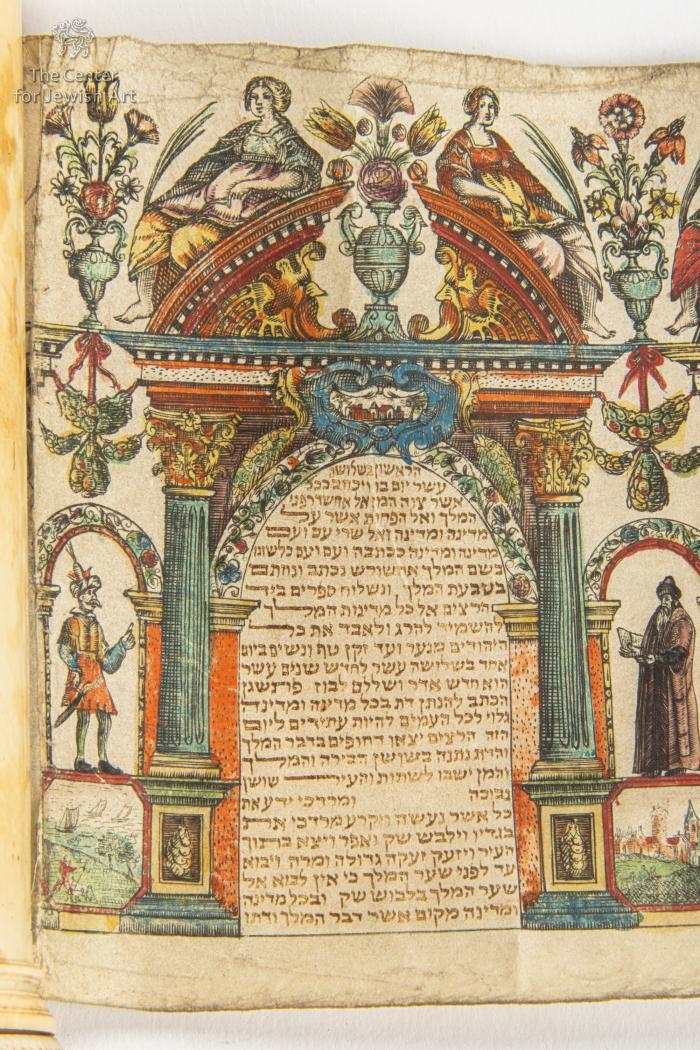
The case: 220 mm (height).
The manuscript (the text, decorations, parchments, and case) is preserved in very good condition.
The seventh column of text (sheet no. 2) is inscribed within an arch, which is surrounded by the engraved and painted decoration. The cartouche in the apex of the arch contains an urban landscape with a boat. The arch is flanked by the figures of Mordecai holding a book (on the right) and Haman with a sword (on the left). Below them, two landscapes: a rural landscape and a sea with boats on it are depicted.
The Book of Esther in Hebrew
The scroll is on display in the Purim room, case no. 30.
For other scrolls sharing the same pattern see "Related objects"; yet another manuscript is stored in the Braginsky Collection in Zurich (megillah no. 27).
Donated to the AEJM by heirs to Tiziana Momigliano (1911-2004).
The scroll is described in:
Claudia de Benedetti, Italia ebraica, storie ritrovate. Scritti in onore di Vivian Mann z.l. / Jewish Italy, rediscovered stories. Essays written in honor of Vivian Mann z.l., Roma 2019, 17-23.
Bibliography concerning the scrolls designed by Shalom Italia or attributed to him:
Sharon Assaf, Emily D. Bilski, Salom Italia’s Esther Scrolls and the Dutch Golden Age, Amsterdam 2011.
A Journey through Jewish Worlds: Highlights from the Braginsky Collection of Hebrew Manuscripts and Printed Books, eds. E.M. Cohen, E. Schrijver, S. Liberman Mintz, Amsterdam 2009, 228-231 (describes another scroll designed by Shalom Italia).
Michael Garel, An Esther Scroll by Shalom Italia, "The Israel Museum Journal" 5 (Spring 1986), 107–108.
Mordecai Narkiss, Yeẓurato shel Shalom ben rabbi Mordechai Italia (1619–1655?) [The Oeuvre of the Jewish Engraver Salom Italia (1619–1655?)], "Tarbiz" 25(4), 1956, 441–451, and: ibidem no. 26(1), 1957, 87–101.
Shalom Sabar, A New Discovery: The Earliest Illustrated Esther Scroll by Shalom Italia, „Ars Judaica” 2012, no. 8, 119–136.
Schöne Seiten. Jüdische Schriftkultur aus der Braginsky Collection, eds. Emile Schrijver, Falk Wiesemann, Evelyn M. Cohen, Sharon Liberman Mintz, Menahem Schmeltzer, Zurich 2011, 274‒279.
Dagmara Budzioch, The Decorated Esther Scrolls from the Museum of the Jewish Historical Institute in Warsaw and the Tradition of Megillot Esther Decoration in the Seventeenth and Eighteenth Centuries – An Outline [Polish: Dekorowane zwoje Estery z Żydowskiego Instytutu Historycznego w Warszawie na tle tradycji dekorowania megilot Ester w XVII i XVIII wieku. Zarys problematyki], Warsaw 2019, 1:155‒159.



